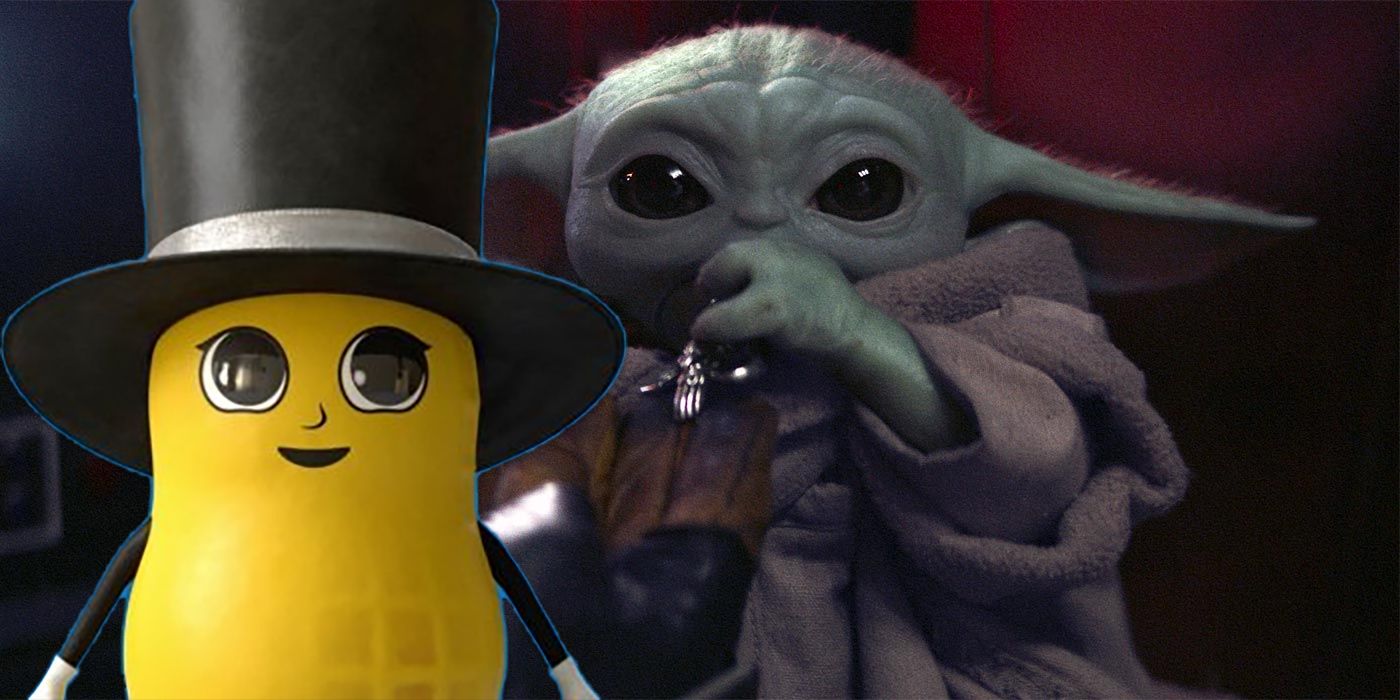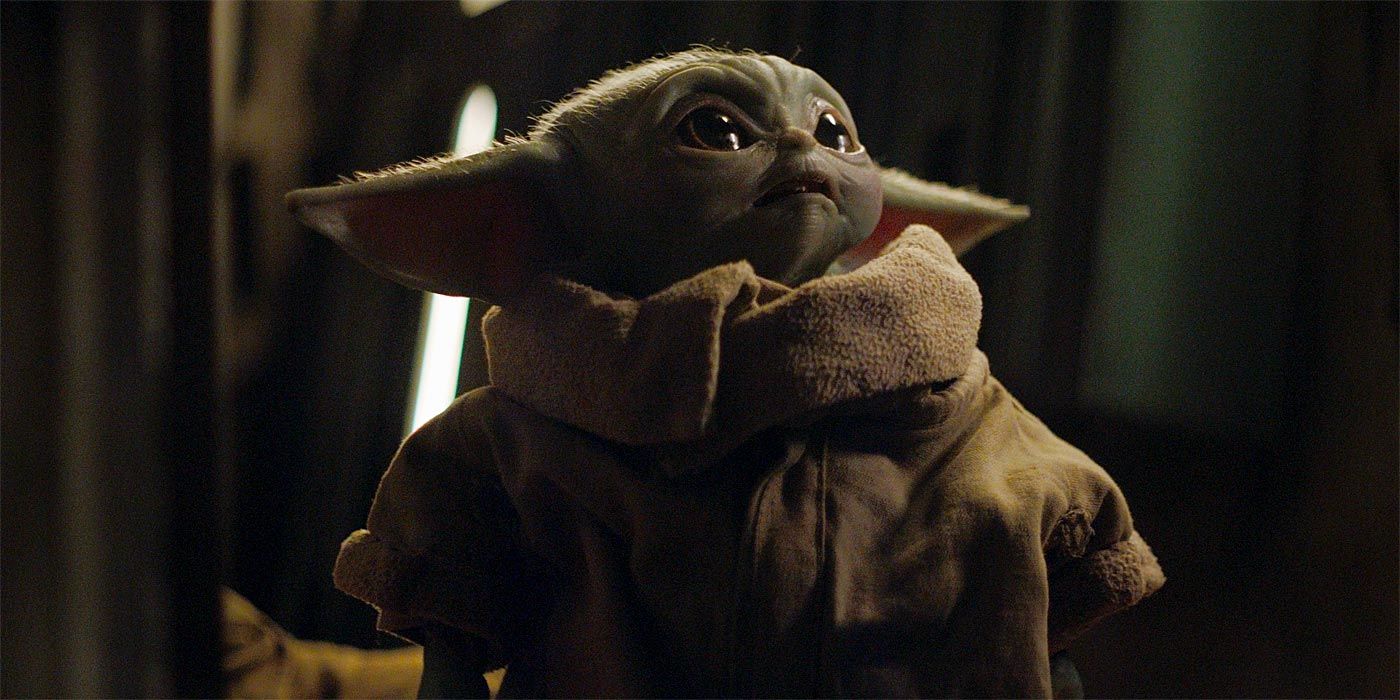When the premiere for The Mandalorian ended, audiences went wild over the sight of Baby Yoda. The tiny green alien won the internet over with its big eyes and adorable oval head, spawning countless memes overnight. Soon, Twitter was aflame with people crossing themselves with holy oil and swearing to protect Baby Yoda for the rest of their lives.
This charming little Yoda isn't the only baby character to go viral in recent years. When he debuted, Baby Groot from Guardians of the Galaxy 2 reduced Marvel fans into cooing wrecks. More recently, Mr. Peanut from Planters met a tragic end when he fell off a cliff to save his friends. However, he didn't stay dead for long. Planters' mascot was revived by the Kool-Aid Man's tears, resulting in the birth of the gigantic-eyed Baby Nut.
While reactions to Baby Nut certainly have been mixed, we're certainly heading towards a new era of babies. Companies have caught on to the hype around creating smaller, adorable versions of pre-established characters. So why are companies pinning a baby label next to everything and why is it effective?
Let's start off with what causes us to have such an intense reactions to babies. A lot of it comes down to science. Studies have shown people are hardwired to respond protectively to round heads, chubby cheeks and large eyes. These features engender positive feelings of nurture and a desire to care for cute little babies.
So what chance does the casual viewer have against Baby Yoda's oval head, round cheeks, and beseeching eyes? The answer is none. The creators of The Mandalorian were probably counting on this and were well rewarded for their efforts. Fans far and wide have taken to various social media outlets to voice their feelings of love and care for the tiny green alien. This exposure serves as a viral marketing campaign that fosters a positive social buzz about the show and helps Baby Yoda lovers bond together worldwide, creating an unshakeable community of knights who will watch the show to make sure Baby Yoda makes it out just fine. Heck, even George Lucas has fallen in love with Baby Yoda and who could blame him?
We could argue that Baby Groot is the first viral babyfied character that successively tapped into our biological responses. However, Japan has been ahead of the curve in this respect with its "kawaii" culture. Starting with the iconic Hello Kitty, Japan has perfected selling youthful cuteness as a commodity, from pocket monsters like Pikachu to moe anime characters. Their international success is a clear indication that we're all dying for the saccharine rush the baby-like visuals bring us. Perhaps American companies have taken notice of Japan's achievements with marketing kawaii culture and are following the trend by creating younger version of well-known characters. Baby Nut may be the first in a wave of characters to be bathed in the fountain of youth as companies try to cash in on the appeal of kawaii culture.
Speaking of cashing in, one simple reason for companies to make adorable baby characters is to expand their toy line. Just type "Baby Groot toys" into Amazon and there are pages of merchandise. Even after three years, there are countless Pop-Eye figures, plushies, keychains, dancing figurines and planters socks, meaning people are still snapping these products up. While Baby Yoda doesn't have a ton of licensed merchandise aside from the life-sized collectible, Mandalorian fans are screaming for more, meaning they're likely going to sell well.
What are companies going to take from this in the future? Baby versions of characters sell! So Planters offing Mr. Peanut and replacing him with the dewey-eyed Baby Nut is a shrewd business move. After all, doing so has worked for Baby Groot and Baby Yoda, so Planters is simply following the blueprint to success in trying to sell more jars of nuts with their cute mascot. Whether this ploy actually succeeds is another story, but the peanut company has definitely generated attention on social media.
Babyfying a character is also a safe way to add a new twist to established canon. Look at spin-offs such as Young Sheldon, Baby Looney Tunes and The Flintstone Kids. Turning pre-established characters into babies is one of the oldest tricks to generate interest, because this move allows audiences to glean more information on the characters' backstories. While Baby Yoda isn't a true babyfication of the OG Yoda, we're still learning more about Yoda's mysterious race (including how strangely they age) and how Yoda could have grown into the tiny badass we see in Star War's prequels. Additionally, putting previously strong characters like Yoda and Groot (or the aloof Mr. Peanut) in a vulnerable state gives audiences the chance to see past their strengths and thus see new depths to their personalities.
Mr. Peanut, Yoda and Groot have been around for 40 years and more. That means their fans have aged up as well, and newer generations may not be as familiar with these beloved characters. Creating baby versions is a great way for companies to appeal to younger audiences by revamping the characters with more modern values and then hooking people in with a cute aesthetic. Younger generations are now aware of and interested in pre-established characters, and this can revitalize old stories as more people dig into the rich character histories. So babyfication is a smart marketing move as it brings in a new pool of potential buyers who buy the current products while giving these buyers exposure to older merchandise such as comics and collector items.
Baby Nut has been the target of hatred on Twitter from users who may be upset at Planter's transparent ploy to cash in on Baby Yoda's success. Either that or Baby Nut's mannerisms are inspiring irritation rather than love. But it's not surprising that Planter babyfied Mr. Peanut as this has worked for pop culture icons such as Groot and Yoda. Baby Nut will certainly not be the last baby reincarnation of a popular character as more and more companies try to take advantage of the cute (kawaii) factor. We'll have to wait to see what 2020 has in store for us but one thing is certain, we have not reached peak internet yet with Baby Nut; there are surely more babies to come.
Created by Jon Favreau, The Mandalorian stars Pedro Pascal, Gina Carano, Carl Weathers, Giancarlo Esposito and Emily Swallow. Season 1 is available now on Disney+ and Season 2 arrives in October.


